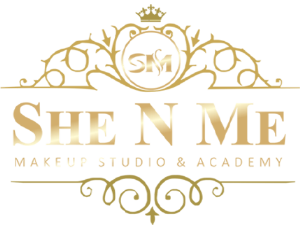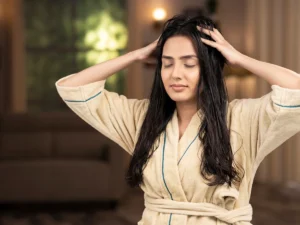Introduction
Everyone aspires to have strong, glossy, and manageable hair. But getting there can be a difficult task. The majority of us struggle with a hair problem that prevents us from having healthy hair.
When it comes to your hair nourishment, hair type, strength, and volume, genes do matter. It does not, however, imply that you have no control over your hair.
This post from She N Me Academy will discuss ten actions you can take to improve the appearance, feel, and health of your hair, as well as strengthen your hair strands and encourage hair development.
Lower the heat
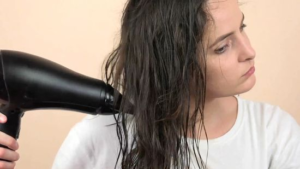
Your hair may suffer from the use of blow dryers, straightening irons, hot curlers, and other heated styling equipment, particularly if it is fine, dry, or brittle. Your hair may get weaker with excessive heat, leading to frizzy or damaged strands.
Researchers who conducted a 2011 study at Trusted Source advise keeping the blow dryer moving and not focused on one area, as well as holding it around 6 inches away from the surface of your hair to minimize damage from drying.
Allow your hair to heal in between blow-drying and other heated styling sessions, limit your frequency of use to two or three times a week.
To lessen the risk of hair damage, turn down the heat on your dryer and other heated styling products. To reduce damage, you might also want to think about applying a heat-protectant cream to your hair.
Improve your daily intake of vitamins
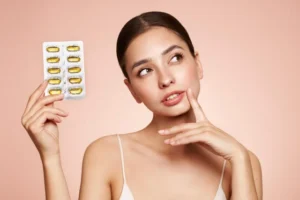
Your hair requires certain vitamins and minerals to be strong and healthy, just like the rest of your body. Research from a trusted source has indicated a possible connection between hair loss and nutritional deficits.
The following vitamins and minerals might be the most crucial for hair nourishment:
- Your hair requires certain vitamins and minerals to be strong and healthy, just like the rest of your body. Research from a trusted source has indicated a possible connection between hair loss and nutritional deficits.
- Sweet potatoes, carrots, pumpkin, spinach, milk, eggs, and yogurt are good sources of vitamin A.
- Dairy products, egg yolks, liver, salmon, avocados, nuts, and seeds are good sources of B vitamins, particularly biotin.
- Bell peppers, strawberries, and citrus fruits are excellent providers of vitamin C.
- Fatty fish, egg yolks, and fortified foods like milk and orange juice are good sources of vitamin D.
- Almonds, spinach, avocados, sunflower seeds, and spinach are good sources of vitamin E.
- Iron can be found in red meat, spinach, oysters, clams, eggs, and lentils.
- Lentils, sirloin, oysters, and pumpkin seeds are all excellent sources of zinc.
- The following vitamins and minerals might be the most crucial for hair nourishment:
Should you find it challenging to obtain the required nutrients from your diet, you might want to think about consuming a multivitamin that contains these vitamins and minerals.
It’s crucial to see your doctor, though, before taking any supplements—especially biotin. Excessive biotin consumption has been shown to influence the outcomes of laboratory tests, including those used to identify heart attacks (Research Trusted Source).
Don’t use a ton of shampoo.
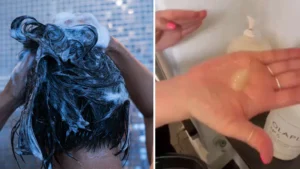
Maintaining a clean hairstyle is crucial. However, most shampoos contain chemicals that deplete your hair of its natural oils in an attempt to eliminate filth and lessen oiliness.
You can probably reduce the frequency of shampoo washing to two or three times per week instead of daily, unless your hair is really oily. Too many washes might dry out your hair and even weaken the hair shaft.
Don’t use too much shampoo, either. The American Academy of Dermatology states that all you need to clean your hair is a quarter-sized amount of shampoo, applied largely to your scalp.
Give your scalp a massage. A perfect hair nourishment
Increasing blood flow to the hair follicles and improving the health and condition of your scalp can both be achieved by stimulating blood circulation in your scalp.
According to a reliable source, giving your scalp a 4-minute massage every day could eventually make your hair stronger and thicker.
You can give yourself a scalp massage by using your fingertips to apply pressure in circular patterns for a few minutes. This can be done with wet hair right before shampooing or on dry hair.
Moreover, a scalp massager is available. These portable, brush-like gadgets stimulate the scalp.
Increase your daily consumption of protein.

Since protein makes up the majority of hair follicles, eating a diet high in protein is essential for healthy hair growth. According to research from Source, a diet low in protein might cause hair loss and thinning.
Foods high in protein that may improve hair health include:
- eggs fish,
- like mackerel and salmon nuts
- and seeds
- lean meats
- spinach and kale beans
- and legumes.
Consider using an egg yolk mask: Visit the She N Me salon to discover masks.
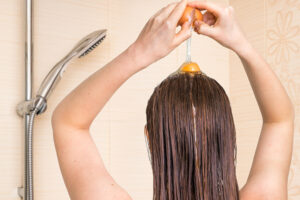
The proteins found in egg yolks are the same proteins found in healthy hair follicles. Furthermore, in a 2018 study, according to a reliable source, egg yolk peptides may aid in promoting hair nourishment.
- Vitamins A and D, biotin, and folate are among the vital nutrients found in egg yolks that have been connected to good hair growth.
- To create your own egg yolk mask, take the following actions:
- Add 3–4 tablespoons of slightly heated coconut oil and 3 egg yolks.
- Well, combine the two components.
- After the mixture is thoroughly combined, apply it to your roots and scalp.
- After applying the mixture to your head, cover it with a shower hat.
- Give it a good ten to fifteen minutes on your head.
- Clean it with a cold water rinse.
Apply a cold rinse.
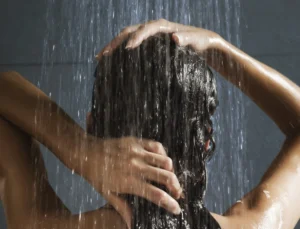
Too hot water during a shower can damage your hair’s cuticle and root simultaneously. Your hair’s cuticles may become more open after using steam in the shower, leaving it dry, frizzy, and more likely to break.
Make a lather with lukewarm water to protect your hair. Finally, give your hair and scalp a final blast of cool water to complete your shower. Your hair may be better able to retain moisture as a result of this helping to seal the cuticle.
Apply aloe vera to your scalp and hair: A perfect She N Me guide.

Vitamins A, C, and E are rich in Aloevera Trusted Source. Your hair’s cells, as well as other healthy cell growth, may be encouraged by these vitamins. Aloe vera also includes folic acid and vitamin B-12, all of which may aid in the promotion of healthy hair nourishment.
It’s uncertain, though, if topical aloe vera application causes these healthy vitamins to really reach the scalp.
You can either search for hair products that include aloe vera ingredients or apply the pure gel of the aloe plant to your hair and scalp. For added conditioning, you may also DIY an aloe vera hair mask.
For more interesting blogs, kindly follow She N Me Academy and visit our social media handles.![]()
![]()
